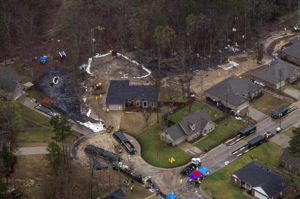A federal judge declined Monday to dismiss a lawsuit filed by the state and federal governments against subsidiaries of Exxon Mobil Corp. over an oil spill in Mayflower last year.

Exxon Mobil's Pegasus pipeline, built in 1947-48, cracked open between two houses in Mayflower's Northwoods subdivision on March 29, 2013, and spilled an estimated 210,000 gallons of heavy crude oil into the neighborhood, drainage ditches and a cove of Lake Conway.
In a 17-page order, U.S. District Judge Kristine G. Baker noted that the defendants -- Exxon Mobil Pipeline Co. and Mobil Pipe Line Co. -- argued that the lawsuit, filed in June 2013, failed to state a claim upon which the court could grant relief.
Baker disagreed.
She concluded that the lawsuit had alleged sufficient facts under the federal Clean Water Act, the state Hazardous Waste Management Act, and the Arkansas Water and Air Pollution Control Act.
The oil companies also argued that the lawsuit had failed to establish the need for an injunction under the Clean Water Act, because the plaintiffs hadn't offered enough information, "including irreparable injury and facts alleging ongoing conduct or harm that must be enjoined," the judge noted.
The lawsuit does not say what actions it might seek halted.
The portion of the pipeline running through Arkansas has been idle since the accident.
In late March, Exxon Mobil submitted to the federal government a remedial work plan proposing measures to upgrade and test the pipeline's northernmost, 648-mile section. That section runs from Patoka, Ill., to Corsicana, Texas. Exxon Mobil is still awaiting approval of the plan, which it expects will take more than a year to complete.
The Justice Department contends the oil companies have violated the Clean Water Act and says the defendants have not disputed that, Baker wrote.
She found that the governments had adequately argued this claim at this point of the lawsuit.
"The Court will not at this stage dismiss injunctive relief as a possible relief measure the Court may later see fit to impose for any proven violations of the CWA," she wrote.
A bench trial is scheduled to begin in U.S. District Court in Little Rock on Feb. 24. Motions are due by Dec. 11.
Three houses have been demolished since the pipeline ruptured because of oil beneath their foundations, and Exxon Mobil has bought about two dozen other homes from residents who didn't want to continue living in the neighborhood. The cleanup continues in the cove, which is separated from the main portion of the lake by a highway.
The Arkansas attorney general's office and the U.S. Justice Department filed the federal lawsuit at the request of the Arkansas Department of Environmental Quality and the U.S. Environmental Protection Agency.
The number of barrels spilled is key in determining civil penalties under the federal Clean Water Act, with the fine set at up to $1,100 per barrel unless "gross negligence" or "willful misconduct" took place. In the latter, the penalty can rise to $4,300 per barrel.
Arkansas law provides civil penalties of $10,000 per violation per day of the Water and Air Pollution Control Act and $25,000 per violation per day of the Hazardous Waste Management Act.
State Desk on 06/10/2014
